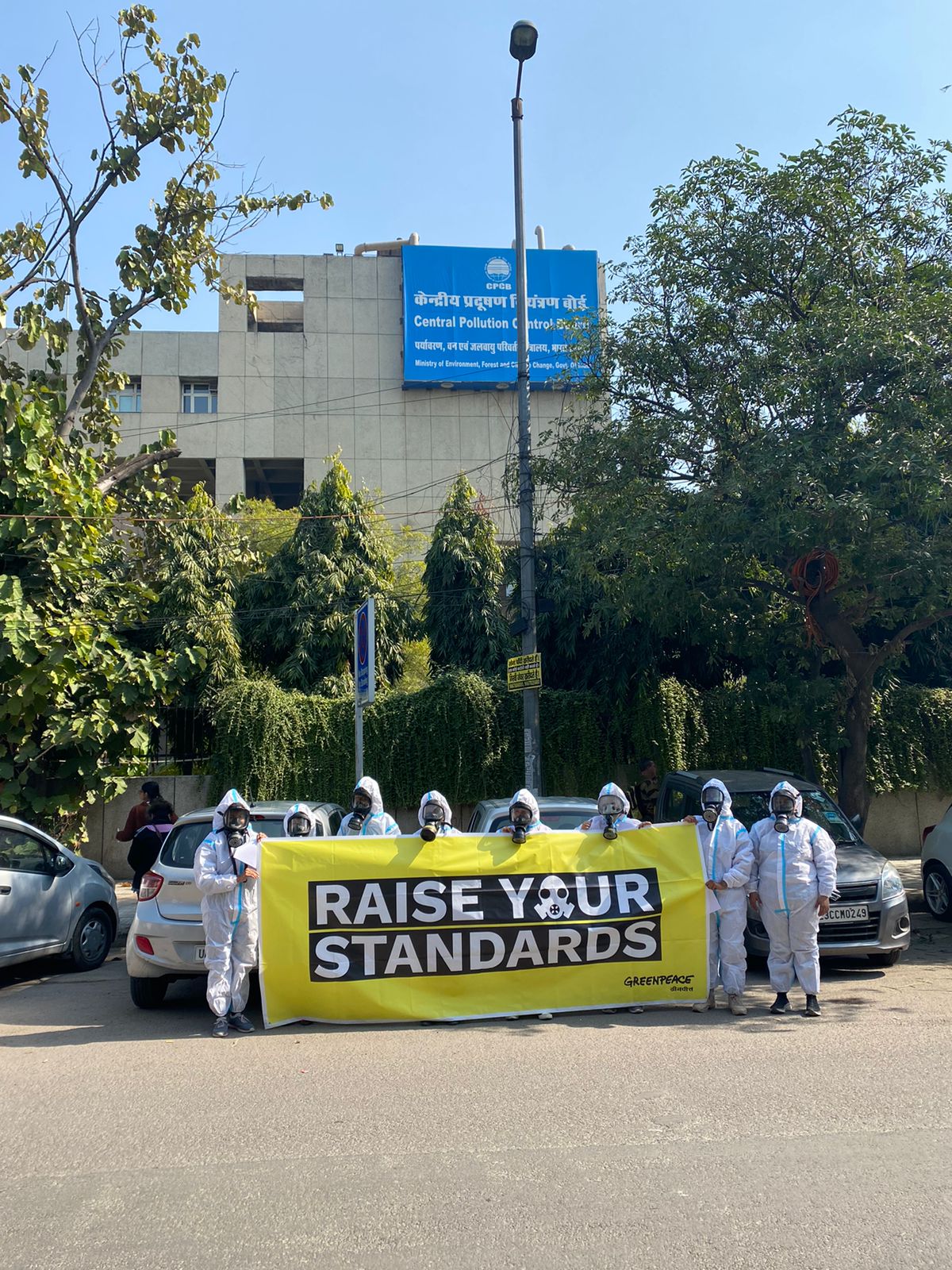NEW DELHI: On 3 February, a group of citizens, along with Greenpeace India, arrived at the Central Pollution Control Board (CPCB) office to demand immediate revision of the National Ambient Air Quality Standards (NAAQS) of India. These included working women cyclists of the Power the Pedal community, mothers, students, environmental activists and public health advocates. In 2021, the World Health Organisation (WHO) revised its Air Quality Standards based on latest scientific insights. In April 2022, Greenpeace India sent an open letter along with a petition signed by over 10,000 citizens to the CPCB, demanding urgent revision of India’s Air Quality Standards (AQS). However, Greenpeace has not received a response or an update on when the NAAQS will meet the latest guidelines.
Over the past week, Greenpeace India volunteers visited many of Delhi’s iconic locations wearing Hazmat suits and gas masks to raise concerns about the capital’s hazardous air quality. India’s annual concentration standards for pollutants continue to be 40 µg/m³ for PM2.5 & NO2–a figure eight times higher than WHO’s standards of 5 µg/m³ for particulate matter and 10 µg/m³ for N02. The participants are also generating support for the ongoing petition addressed to Delhi’s Chief Minister demanding better transportation systems for cleaner air.
Amruta S. Nair, Climate and Energy Campaigner at Greenpeace India, said, “Air pollution has emerged as a major health crisis in India, and a financial disaster affecting millions of people. The current standards do not reflect the latest science on the impacts of air pollution on human health, especially on vulnerable groups such as children, senior citizens, women, daily wage labourers—especially outdoor labourers, sexual minorities and more. Air pollution is becoming a huge factor in out-of-pocket expenditure, which is aggravating inequalities in society. Unfortunately, the existing standards offer politicians and policy-makers leeway to ignore such a big health emergency.”
“As a common woman who is a domestic worker and a homemaker, it makes me extremely proud to voice for a cause that affects our everyday lives. Our health is at stake; I don’t want my children to step out wearing hazmat suits bearing the burden of an unsafe future. Our health and our future need to be taken care of, and it is the responsibility of both citizens and the government,” says Kusum, Power the Pedal Cyclist.
With placards and banners saying, “Air Pollution Se Azadi” (freedom from air pollution), “Raise Your Standards” and “Clean Air is a Fundamental Right”, the citizens attempted to grab the attention of policymakers, while raising awareness about the limitations of existing National Air Quality Standards. They also demanded transparency and accountability from the CPCB in its decision-making processes.
‘We are here to remind the CPCB that when we achieve the WHO guidelines for air quality, we will save millions of lives, billions of rupees, and future generations from the ravages of climate change and air pollution. I am here today as a mother, a woman and a concerned citizen, to ensure we are doing everything in our power to fight air pollution so we can ensure quality air and life to the people of this country,” said Bhavreen Kandhari, Founder, Warrior Moms.
Avinash Chanchal, Campaign Manager at Greenpeace India, said, “Our cities should prioritise public transportation and non-motorised transport (such as cycling/walking) over private transport. Unsustainable mobility isn’t just polluting, it also causes the shrinkage of public spaces for lower- and lower-middle-income communities. Therefore, we are demanding the creation of a Sustainable Urban Transportation Fund as our transport infrastructure needs to move people, not cars.”
Citizens’ groups want pollution control board to raise air quality standards
- Advertisement -

